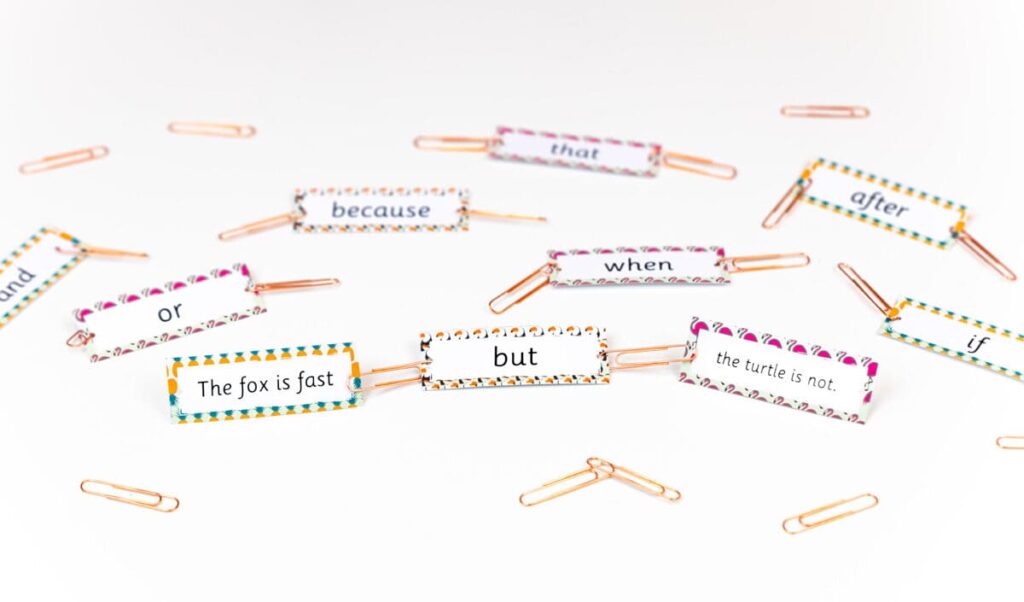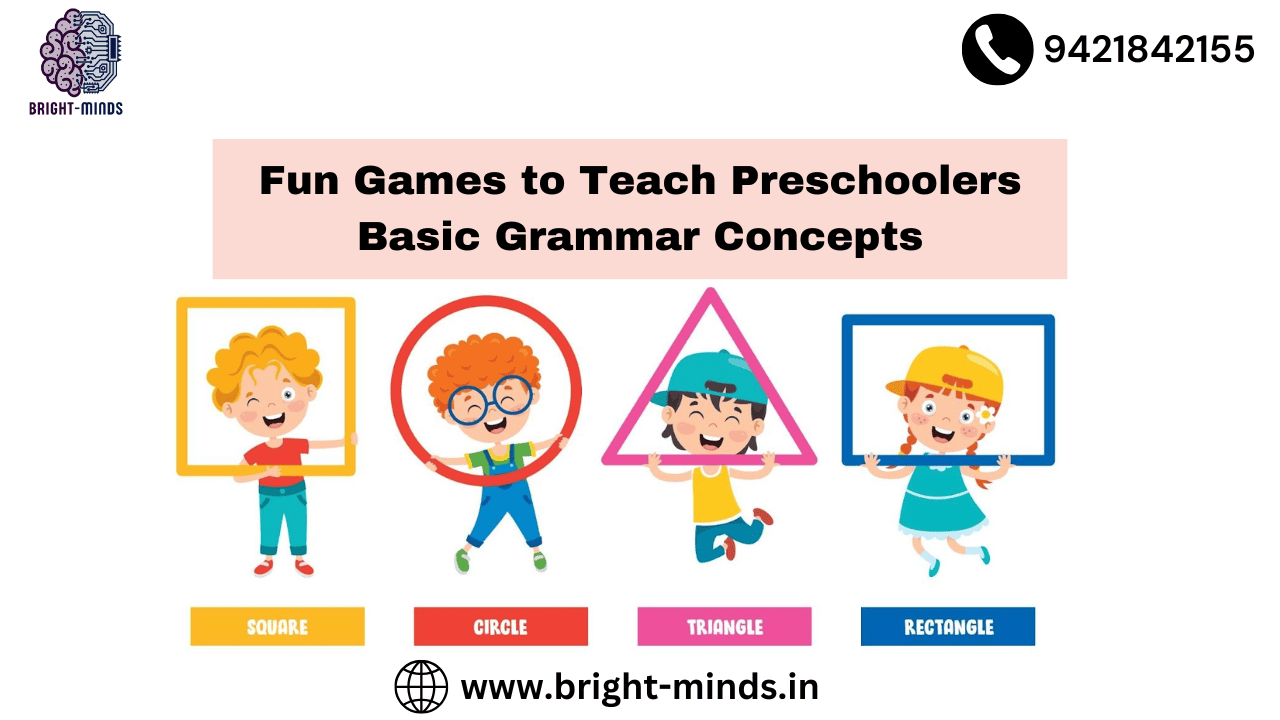Preschoolers are at an age where language skills are rapidly developing, making it the perfect time to introduce basic grammar concepts. While teaching grammar might seem like a challenging task, incorporating games and activities can transform it into a fun, interactive experience. This blog explores various engaging games and activities that can help young children grasp foundational grammar concepts like nouns, verbs, adjectives, and sentence formation.
Why Teach Grammar to Preschoolers?
Children who comprehend grammar are able to communicate successfully since it is one of the building blocks of language. Here are a few main advantages:
- Improved Communication: Assists kids in clearly expressing themselves.
- Foundation for Reading and Writing: The growth of literacy depends on the mastery of grammar.
- Cognitive Development: Improves the ability to reason logically and construct sentences.
Basic Grammar Concepts for Preschoolers
Let’s clarify a few key grammatical ideas that are appropriate for preschoolers before getting into the games:
- Nouns: Words that name persons, places, or objects are called nouns (e.g., cat, apple).
- Verbs: Verbs are action words, such “run” and “jump.”
- Adjectives: Words that describe nouns are called adjectives (e.g., red, huge).
- Simple Sentences: When nouns and verbs are combined, as in “The dog runs.”
1. Noun Games
a. Name That Object
- What You Need: Commonplace things or images of them.
- How to Play: Ask the child to name an object or picture you’ve shown them. Say, “What is this?” while holding up an apple, for instance. Encourage them to use words like “red apple” to further describe it.
- Skills Gained: Noun recognition and vocabulary expansion.
b. Noun Treasure Hunt
- A list of basic necessities, such as a ball, book, and spoon.
- To play, hide items all throughout the room. When you call out a noun, the youngster has to locate it and bring it to you.
- Variation: Make use of themes such as “toys” or “kitchen items.”
- Identifying nouns and thematic vocabulary are among the skills developed.
2. Verb Games
a. Action Charades
- What You Need: A list of basic movements, like running, jumping, and clapping.
- How to Play: Have the child guess the action by acting out a verb without saying anything. Next, change roles.
- Skills Developed: Developed abilities include language comprehension and word-action association.
b. Verb Hopscotch
- Supplies Needed: Masking tape or chalk to make a hopscotch grid.
- To play : write a verb (action word) in every square. As they hop on it, the youngster must execute the action (such as “jump” or “clap”).
- Skills Developed: Verb recognition and gross motor skills were developed.
3. Adjective Games
a. Describe the Object
- What You Need: A bag full of variously textured, colored, and shaped items.
- How to Play: Without seeing, let the youngster choose an object and use adjectives to describe it, such as “It’s round and soft.”
- Skills Developed: Developed abilities include sensory investigation and descriptive language.
b. Adjective Sorting
- What You Need: Adjectives and object photos on cards.
- How to Play: Assign adjectives to images (for example, “blue” to a sky image).
- Variation: Make sorting categories like “colors” and “sizes.”
- Skills Developed: Acquired Proficiency in Descriptive Words
4. Sentence Formation Games
a. Build a Sentence
- What You Need: Adjectives, verbs, and nouns word cards.
- How to Play: Give the youngster an adjective, a verb, and a noun, then assist them in creating a basic phrase. As an illustration, “The big dog runs.”
- Skills Developed: Sentence structure and basic grammar are among the skills developed.
b. Story Dice
- What You Need: You’ll need dice with words or images on each side.
- How to Play: Use the words or images to form a statement after rolling the dice. The sentence might read, “The cat jumps over the ball,” for instance, if the dice display a cat, a ball, and the word “jumps.”
- Skills Gained: Storytelling, creativity, and grammar usage.
5. Interactive Group Games
a. Grammar Relay Race
- What You Need: Grammar-related cards with exercises like “Act out a verb” and “Find a noun.”
- How to Play: To play, divide the kids into teams. Before going on to the next station, each team has to finish a grammar exercise.
- Skills Developed: Developed abilities include identifying grammar and working as a team.
b. Musical Grammar
- What You Need: A deck of grammar cards and some music.
- How to Play: As the music plays, pass the cards around. The youngster holding the card reads the card and acts or describes it (for example, “Jump” or “Soft toy”) when the music stops.
- Skills Gained: Recall of grammar and quick thinking.
Incorporating Grammar into Daily Activities

1. Conversations at Mealtime
During meals, promote the usage of verbs and adjectives. For instance, inquire, “What are you eating?” and then, “Tell me about it!”
2. Outdoor Play
During playing or a stroll, identify nouns, verbs, and adjectives. “The big tree is swaying,” for instance.
3. Storytime
Take a moment throughout a story to look for nouns, verbs, or adjectives. “Can you find the action word in this sentence?” is one example.
Common Challenges and How to Overcome Them
1. Limited Attention Duration
Solution: Use visual aids, encourage active participation, and keep games brief and interesting.
2. Misunderstandings of Grammar Concepts
Solution: To strengthen learning, concentrate on a single idea at a time and employ repetition.
3. Insufficient Interest
Solution: Include your favorite toys, themes, or characters in language exercises.
Benefits of Grammar Games for Preschoolers
- Increased Engagement: Playing games adds excitement and interaction to language instruction.
- Better Retention: Play-based strategies aid in children’s conceptual retention.
- Development of Social Skills: Group activities encourage cooperation and communication.
- Building Confidence: Being proficient in fundamental grammar increases one’s sense of self-worth and academic preparedness.
Conclusion
Preschool grammar instruction doesn’t have to be difficult. Learning may be made memorable and pleasurable by implementing entertaining games and activities. These techniques, which range from imaginative sentence-building exercises to action-packed charades, accommodate various learning preferences and maintain children’s interest. Play now and see how your preschooler’s language development blossoms!
Also Read:
https://bright-minds.in/unlocking-word-meaning-for-class-ukg-english-to-hindi/

